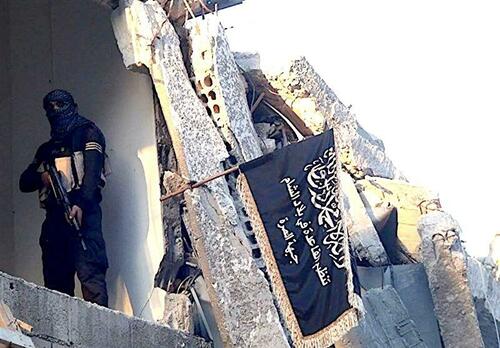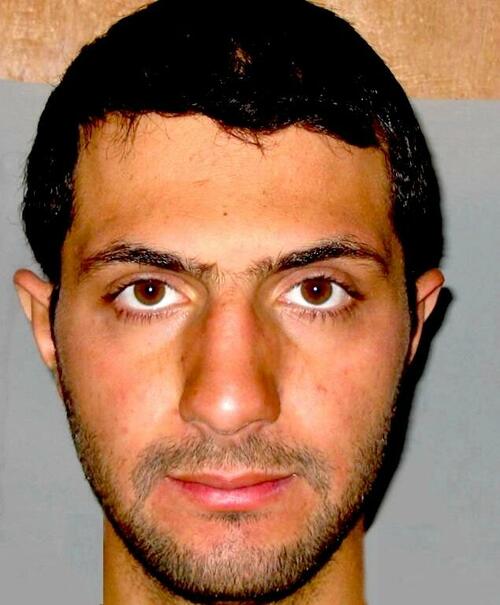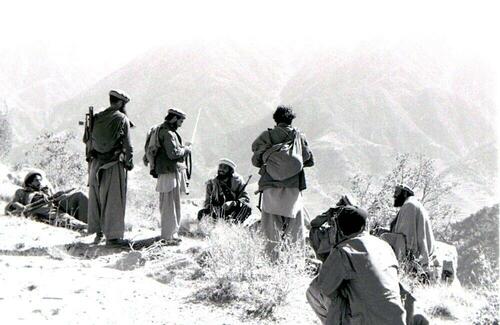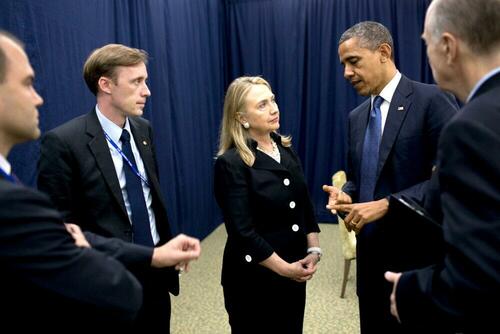
Authored by Alan Macleod via ConsortiumNews.com,
Corporate media is heralding the fall of Bashar al-Assad and the emergence of Abu Mohammed al-Jolani as the new leader of Syria, despite his deep ties to both Al-Qaeda and ISIS.
“How Syria’s ‘diversity-friendly’ jihadists plan on building a state,” runs the headline from an article in Britain’s Daily Telegraph that suggests that Jolani will construct a new Syria, respectful of minority rights. The same newspaper also labeled him a “moderate Jihadist.” The Washington Post described him as a pragmatic and charismatic leader, while CNN portrayed him as a “blazer-wearing revolutionary.”
Meanwhile, an in-depth portrait from Rolling Stone describes him as a “ruthlessly pragmatic, astute politician who has renounced ‘global jihad’” and intends to “unite Syria.” His “strategic acumen is apparent,” writes Rolling Stone, between paragraphs praising Jolani for leading a successful movement against a dictator.
CNN even scored an exclusive, sit-down interview with Jolani, even as his movement was storming Damascus. When asked by host Jomana Karadsheh about his past actions, he responded by saying, “I believe that everyone in life goes through phases and experiences … As you grow, you learn, and you continue to learn until the very last day of your life,” as if he were discussing embarrassing teenage mistakes, not establishing and leading the Al-Nusra Front, Al-Qaeda’s franchise in Syria.
This is a far cry from the first time CNN covered Jolani. In 2013, the network labeled him one of “the world’s 10 most dangerous terrorists,” known for abducting, torturing and slaughtering racial and religious minorities.
Still on the U.S. terrorist list today, the F.B.I. is offering a $10 million reward for information about his whereabouts. Washington and other Western governments consider Jolani’s new organization, Hay?at Tahrir al-Sham (HTS), as one and the same as Al-Qaeda/Al-Nusra.
This poses a serious public relations dilemma for Western nations, who supported the HTS-led overthrow of President Bashar al-Assad. And thus, Politico and others report there is a “huge scramble” in Washington to remove HTS and Jolani from the terrorist list as quickly as possible.
The Making of a Radical
Jolani has sought to distance himself from his past and present himself as a moderating force that can attempt to unite an intensely divided Syria. While he has, in recent years, displayed a willingness to compromise with other forces and factions, it is far from clear whether the tens of thousands of soldiers he commands — units made up primarily of former fighters from al-Qaeda/al-Nusra and ISIS — will be in a charitable mood once they cement their power.
“Syria is being purified,” he told a crowd in Damascus on Dec. 8. “This victory is born from the people who have languished in prison, and the fighters broke their chains,” he added.
Jolani — whose real name is Ahmed Hussein al-Shar’a — was born in 1982 in Saudi Arabia to parents who fled the Golan Heights area of Syria after the 1967 Israeli invasion. In 2003, he went to Iraq to fight against American forces. After three years of war, he was captured by the U.S. military and spent over five years in prison, including a stint at the notorious Abu Ghraib torture center.
Mugshot of al-Julani in 2006, after his capture by U.S. forces in Iraq. (DoD, Wikimedia Commons, Public domain)
While in Iraq, Jolani fought with ISIS and was even a deputy to its founder. Immediately upon release in 2011, ISIS sent him to Syria with a rumored $1 billion to found the Syrian wing of al-Qaeda and participate in the armed protest movement against Assad that arose out of the Arab Spring.
Realizing the extremely poor reputation al-Qaeda had in the region and across the world, Jolani attempted to rebrand his forces, officially shuttering the al-Nusra Front in January 2017 and, on the same day, founding HTS. He claimed that HTS preaches a very different ideology and that it will respect Syrian diversity. Not everyone is convinced of this, least of all the British government, who immediately proscribed HTS, describing it as merely an alias of Al-Qaeda.
“Al-Qaeda/ISIS man didn’t ‘reinvent himself.’ He had the whole propaganda and intelligence apparatus of the ‘West,’ including the BBC, doing it for him,” remarked co-founder of The Electronic Intifada, Ali Abunimah.
New Government Likes Israel, Hates Hezbollah
The name “al-Jolani” translates to “From the Golan Heights.” And yet, the leader appears distinctly unconcerned with the Israeli invasion of his homeland. The IDF has taken much of southern Syria, including the strategic Mount Hermon, overlooking Damascus. Prime Minister Benjamin Netanyahu has stated that this is part of a permanent operation. “The Golan Heights…will forever be an inseparable part of the State of Israel,” he proclaimed.
Jolani has already said that he has no intention of confronting Israel. “Syria is not ready for war and does not intend to go into another war. The source of concern was the Iranian militias, and Hezbollah, and the danger has passed,” he said — a strange thing to say while Israel is carrying out the largest Air Force operation in its history, pounding military targets all over Syria. Other HTS spokespersons have also categorically refused to comment on Israel’s attack on the country, even when pressed by incredulous Western journalists.
Jolani’s comments, singling out two Shia forces rather than Israel as enemies of the state, will have many concerned that this could signal a return to the process of Shia slaughter ISIS waged over much of Syria and Iraq. In 2016, the U.S. House of Representatives voted 383-0 to classify this process as a genocide.
Fortunately, the new government will likely be a coalition of disparate and moderating forces. However, these groups seem to share a common thread: they all appear to be pro-Israel. A commander of the secular Free Syrian Army, for example, recently gave an interview to The Times of Israel, where he looked forward to a new era of “friendship” and “harmony” with its neighbor to the south. “We will go for full peace with Israel… Since the outbreak of the Syrian civil war, we have never made any critical comments against Israel, unlike Hezbollah, who stated they aim to liberate Jerusalem and the Golan Heights,” he said.
The commander added that “Israel will plant a rose in the Syrian garden” and asked for the country’s financial support in forming a new government.
Israeli soldiers from the Shaldag Unit on the Syrian side of Mount Hermon earlier this month. (IDF Spokesperson’s Unit, Wikimedia Commons, CC BY-SA 3.0)
Other anti-Assad forces have gone even further, with one individual stating that Israel
“Isn’t hostile to those who are not hostile toward it. We don’t hate you, we love you very much…we were quite happy when you attacked Hezbollah, really happy, and we’re glad that you won.”
Statements like these might surprise a casual observer. But the reality is that Israel has been funding, training and arming much of the Syrian opposition since its inception. This includes Al-Qaeda, whose wounded fighters are treated by Israel.
And while radical Islamist forces appeared to be enemies with everyone, the one group they fastidiously avoided any confrontation with was Israel. Indeed, in 2016, ISIS fighters accidentally fired upon an Israeli position in the Golan Heights, thinking they were Syrian government forces, then quickly issued an apology for doing so.
From the Golan Heights, the year-long Israeli campaign against Hezbollah and Syrian Army positions also seriously weakened both forces, aiding the opposition in their victory.
Al-Qaeda & US — Complicated Relationship
While both journalists and politicians in the U.S. are scrambling to change their opinions on Jolani and HTS, the reality is that, for much of its existence, Washington has enjoyed a very close relationship with al-Qaeda.
Mujahideen in Kunar, Afghanistan, Jan. 1, 1987. (erwinlux, Flickr, CC BY-SA 3.0, Wikimedia Commons)
The organization was born in Afghanistan in the 1980s, thanks in no small part to the C.I.A. Between 1979 and 1992, the C.I.A. spent billions of dollars funding, arming, and training Afghan Mujahideen militiamen (like Osama bin Laden) in an attempt to bleed the Soviet occupation dry. It was from the ranks of the Mujahideen that bin Laden built his organization.
During the 1990s, bin Laden’s relationship with the U.S. soured, and it eventually became a principal target for al-Qaeda, culminating in the infamous Sept. 11, 2001, attacks on New York City and Washington, D.C.
The Bush administration would use these attacks as a pretext to invade both Afghanistan and Iraq, claiming that America could never be safe if al-Qaeda were not thoroughly destroyed. Bin Laden became perhaps the most notorious individual in the world, and American society was turned upside down in a self-described effort to rout Islamic extremism.
And yet, by the 2010s, even as the U.S. was ostensibly at war with al-Qaeda in Iraq and Afghanistan, it was secretly working with it in Syria on a plan to overthrow Assad. The C.I.A. spent around $1 billion per year training and arming a wide network of rebel groups to this end. As Jake Sullivan, now the U.S. national security adviser, told Secretary of State Hillary Clinton in a leaked 2012 email, “AQ [al-Qaeda] is on our side in Syria.”
Jake Sullivan, second from left, as deputy chief of staff to the secretary of state, with his boss Hillary Clinton and President Barack Obama, November 2012. (White House, Pete Souza)
Thus, while many casual observers may be shocked to see the media and political class embrace the leader of al-Qaeda in Syria as a modern, progressive champion, the reality is that the U.S. relationship with the group is merely reverting to a position it has previously held. Consequently, it appears that the War on Terror will come to an end with the “terrorists” being redesignated as “moderate rebels” and “freedom fighters.”
Who Gets to Define ‘Terrorist?’
Of course, many have argued that the U.S. Terrorist List is entirely arbitrary to begin with and is merely a barometer of who is in Washington’s good books at any given time. In 2020, the Trump administration removed Sudan from its state sponsors of terror list in exchange for the country normalizing relations with Israel, proving how transactional the list was.
A few months later, it removed the East Turkestan Islamic Movement (a Uyghur militia currently active in Syria) from its list because of its hardening attitude towards China, seeing ETIM as a useful pawn to play against Beijing.
Washington also continues to keep Cuba on its terror list despite there being no evidence of the island supporting terror groups.
And the U.S. refused to remove Nelson Mandela from its list of the world’s most notorious terrorists until 2008 — 14 years after he became President of South Africa. In comparison, Jolani’s redesignation might take fewer than 14 days.
A giant rebranding operation is taking place. Both corporate media and the U.S. government have attempted to transform the founder and head of an al-Qaeda affiliate organization into a woke, progressive actor. It remains to be seen how exactly Jolani will govern and whether he can maintain support from a wide range of Syrian groups. Given what we have seen so far, however, he can be confident of enjoying strong support from the Western press.
Tyler Durden
Tue, 12/17/2024 – 20:55



